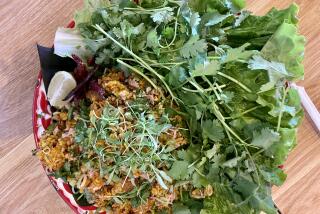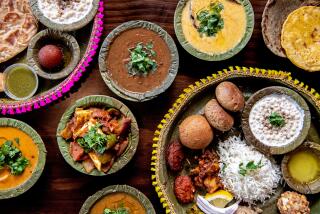BREAD: made at home in the Indian style
India’s breads are as aromatic and enticing as its curries. And they are winning new devotees as Indian restaurants spread through the city.
Who wants plain old garlic bread when you can have garlic naan, plucked steaming from the tandoor oven, or savory onion kulcha or rich wheat chapatis and parathas, which are India’s equivalent to flour tortillas and pita bread?
Then there are pooris, which puff up like balloons when deep-fried, and crisp pappadums, made of lentil flour, that will appeal to anyone who likes chips. Available spiced or plain, the pappadums can be purchased at Indian groceries and baked over a burner or fried at home.
Tandoor breads like naan are impossible to duplicate without the Indian oven. At their highest heat, American home ovens are merely tepid in comparison. Happily, chapatis, pooris and parathas are easy to make and practical for home cooks. The dough can be prepared in advance, stored in the refrigerator and used as needed. The only cooking implements required are a large skillet or griddle and a deep pan or wok for frying the pooris. Indians call the griddle a tava and the wok a karhai.
Parathas are interesting because they can be stuffed in a variety of ways. The filling might be a spiced cauliflower or potato mixture, meat or an aromatic combination of onions, garlic and cilantro. The technique is to form the dough into a cup, insert the filling, close the dough around it, then roll the paratha into a thin circle and brown it in oil in a skillet or on a griddle.
Plain parathas are folded into layers, as if one were making puff pastry, then rolled out and cooked. Chapatis are baked on a griddle, just like tortillas. And pooris remind one of sopaipillas, the way they puff when fried.
These breads are made without yeast and do not include butter, shortening or oil, other than that used in cooking. Salt brings out their flavor, but may be reduced or eliminated.
For a typical Indian breakfast, have a chapati or paratha with spiced hot tea and a bowl of yogurt. The chapati can be dressed up with a pat of butter and a sprinkling of brown sugar or honey. A Sunday vegetarian breakfast might consist of pooris and pappadums served with mango chutney, aloo bhaji (potato cubes sauteed with spices), yogurt raita (yogurt mixed with cucumber), fresh fruit and tea.
Pooris would accompany raita and spiced garbanzo beans for a lunch or snack, and an Indian might make a meal of a stuffed paratha with raita and mango chutney. The chapati is an all-purpose bread that accompanies curries, dal (lentils) or any dish.
Before trying the breads, it can be helpful to watch an expert make them. Throughout June, demonstrations are taking place continuously at the Gaylord India Restaurant on La Cienega Boulevard in Beverly Hills. The restaurant is celebrating a Festival of Indian Breads, and to make the breads better known is serving them with meals at no extra charge and providing recipes.
Gaylord chef Chet Ram, who is from New Delhi, demonstrated how to make parathas, pooris and chapatis, the recipes for which follow.
The recipes call for whole-wheat flour. For the best results, use flour from an Indian grocery, which will give a lighter effect. Supermarket whole-wheat flour may also be used, and the whole-wheat flour can be lightened with all-purpose flour, if desired.
CHAPATIS
4 3/4 cups whole-wheat flour
2 cups water
Mix flour and water and knead to firm dough. Let stand 15 minutes. Divide dough into 16 to 18 pieces and form each into ball. Let stand 15 minutes.
Roll each out to thin circle about 8 inches in diameter. Heat heavy skillet or griddle until very hot.
Bake each chapati on griddle until browned. Turn 3 times, allowing chapati to bake about 30 seconds each turn. After final turn, press down edges that have puffed up. Serve at once. Makes 16 to 18 chapatis.
POORIS
2 cups whole-wheat flour
1 cup unbleached all-purpose flour
1/4 teaspoon salt, optional
1 cup plus 1 tablespoon water
1 quart oil for deep-frying
Mix flours, salt and water and knead well to make smooth dough. Dough should be firm, not soft. Let stand 15 minutes.
Divide into 12 pieces and form each into ball. Let balls stand 15 minutes. Coat each lightly with oil, then roll out to thin circle. Deep-fry in very hot oil (400 to 450 degrees) until poori puffs up and becomes golden brown. Drain on paper towels. Makes 12 pooris.
PARATHAS
4 1/2 cups whole-wheat flour, about
1/2 teaspoon salt, optional
2 cups water
Oil or clarified butter
Combine flour, salt and water and knead to firm dough. Let stand 15 minutes. Divide dough into 10 to 12 pieces and form each into ball. Let stand 15 minutes.
Roll each ball, 1 at a time, to thin circle. Brush circle lightly with oil. Fold in half. Brush top with oil. Fold in quarters. Dip paratha in additional flour to coat lightly, then roll out in triangle shape.
Heat 1 tablespoon oil in skillet. Fry paratha until browned on each side, drizzling additional oil around edges as needed. Makes 10 to 12 parathas.
STUFFED PARATHAS
Paratha
Potato Stuffing
Meat Stuffing
Cauliflower Stuffing
Onion-Garlic-Cilantro Stuffing
Flour
Oil
Make Paratha dough and form into balls as instructed. Place 1 dough ball in palm of hand. Shape to form cup. Place about 2 tablespoons desired stuffing in cup. Pull up edges of dough to cover mixture completely and seal. Shape into ball again. Flatten ball, flour lightly and roll out to thin circle.
Heat small amount of oil in large skillet. Cook paratha 40 to 50 seconds on each side, drizzling additional oil around edges. Cut in half or in quarters to serve. Makes 10 to 12 Stuffed Parathas.
Potato Stuffing
2 medium potatoes, boiled, peeled and mashed
1 cup cooked green peas
1 tablespoon minced fresh ginger root
1 teaspoon cumin seeds
1 teaspoon Garam Masala
1/2 teaspoon cayenne pepper
1/4 teaspoon salt
Combine potatoes, peas, ginger root, cumin, Garam Masala, cayenne and salt and mix well. Makes about 3 cups.
Garam Masala
1 (2-inch) stick cinnamon
1 teaspoon cumin seeds
1 teaspoon coriander seeds
12 to 14 whole cloves
12 to 14 black peppercorns
Seeds from 6 to 8 cardamom pods
Dash ground nutmeg
Dash ground mace
Place cinnamon stick, cumin seeds, coriander seeds, cloves, peppercorns and cardamom seeds in single layer in small baking pan. Bake at 150 degrees 1 hour. Cool. Grind to fine powder in spice grinder. Stir in nutmeg and mace. Store in covered jar. Makes about 5 teaspoons.
Meat Stuffing
1 pound lamb, chicken or beef, minced very fine or ground
2 tablespoons minced fresh ginger root
2 teaspoons cumin seeds
2 teaspoons Garam Masala
1 teaspoon cayenne pepper
Salt
Combine meat, ginger root, cumin seeds, Garam Masala and cayenne in skillet and cook 3 to 4 minutes, until meat is lightly browned. Season to taste with salt. Makes 2 cups.
Cauliflower Stuffing
1/2 medium head cauliflower, finely grated
1 tablespoon minced fresh ginger root
1 teaspoon cumin seeds
1 teaspoon Garam Masala
1/2 teaspoon cayenne pepper
Salt
Combine cauliflower, ginger root, cumin seeds, Garam Masala and cayenne and season to taste with salt. Makes 3 cups.
Onion-Garlic-Cilantro Stuffing
1 large onion, minced
3 to 4 cloves garlic, minced
1/2 bunch cilantro, minced
1 tablespoon chopped fresh ginger root
1/2 teaspoon cumin seeds
1/4 teaspoon cayenne pepper
Salt
Combine onion, garlic, cilantro, ginger root, cumin seeds and cayenne and season to taste with salt. Makes 1 3/4 cups.


